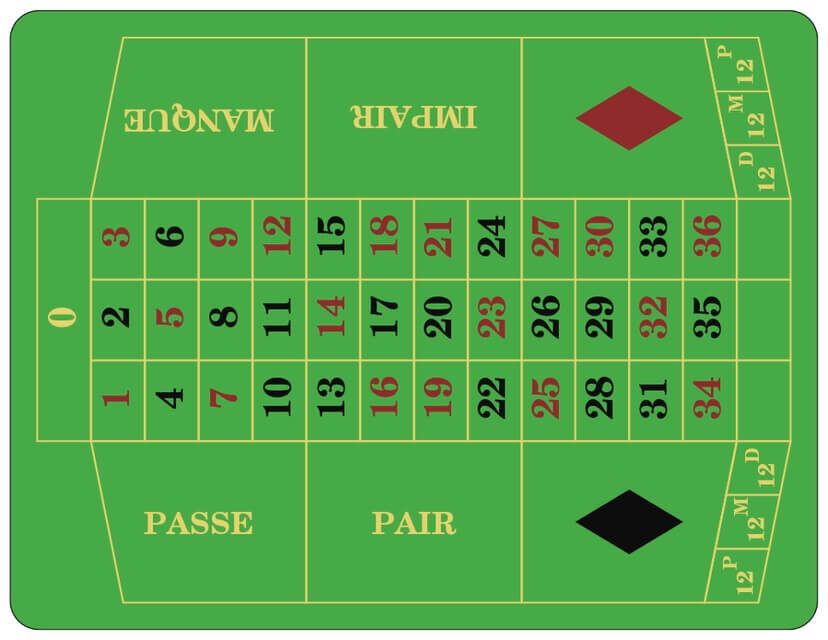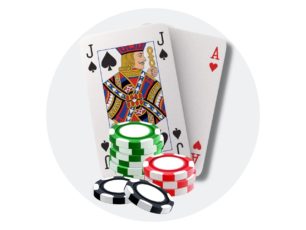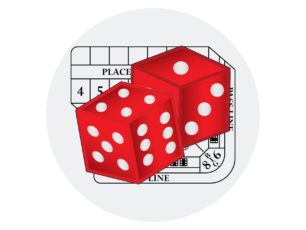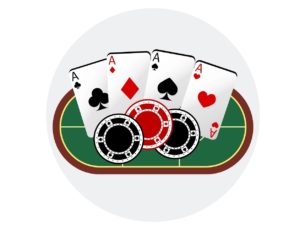A Recap on How to Play Roulette
A game of roulette begins with all of the players around the table placing their bets on specific areas of the board above. Once all of the bets have been set, the croupier or dealer spins the roulette wheel and, after a short wait, throws the ball into the track outside of the wheel in the opposite direction. After that, it's just a matter of waiting until the ball lands in one of the numbered and coloured slots on the wheel and paying out winners based on the bets that they placed.
As we can see, much of the strategy needed to win a game of roulette comes down to placing a large bet on the right number at the right time. And as there are so many different bets available in the game, it's best to learn this first before we dive deeper into the maths.
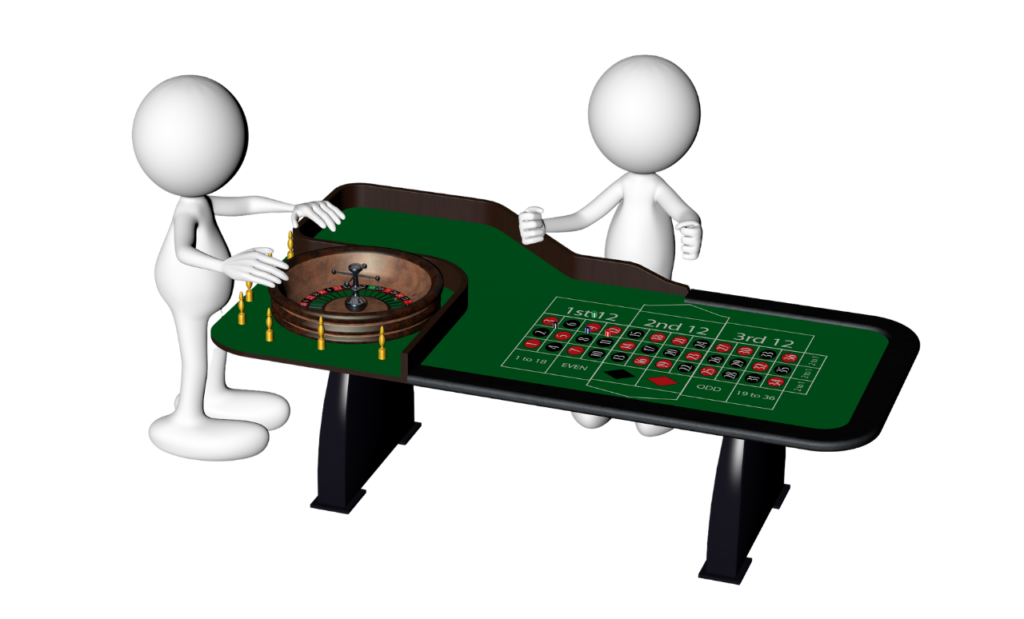
Roulette Tables
If you log on to any live casino site, you'll notice that there are two kinds of roulette games: European and American. Between these two variants, there is only one major difference: the European version has only the 0 tile while the American version has both a 0 and a 00 tile. This is where the names “Single Zero” and “Double Zero” roulette come from
This simple addition of one extra tile, while it seems fairly innocuous, actually has a huge impact on your odds of winning when playing roulette. It is the same reason why the best roulette strategy often involves playing on European-style tables.
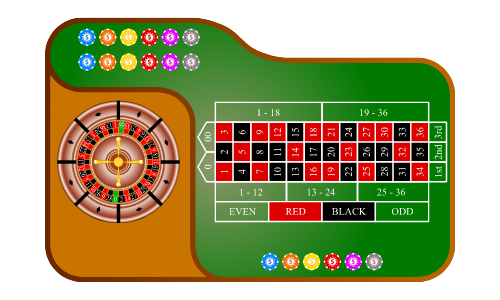
What are the odds on Roulette?
On both layouts of the roulette table, there are 12 different types of standard bets that you can place. These bets each have different odds and payout amounts, and are indicated by placing chips on specific areas on the table layout. To make them easier to learn, these basic bets are split into two categories: inside bets and outside bets.
Inside Bet Odds
Inside bets wager on the ball landing on specific numbers, and are so named because the bets are placed inside the number grid of the roulette table layout. These bets typically offer higher payouts, but are also more difficult to land. The inside bets include:
Wager that the ball will land on one number. To indicate this bet, chips are placed in the center of the tile of the chosen number. The payout for these bets is 35 to 1.
Wager that the ball will land on either of two adjacent numbers on the grid. (Numbers that are separated by a different number require two single bets.) To indicate this bet, chips are placed on the edge between the two selected numbers, such as 13-16 or 29-30. Split bets pay out 17 to 1.
Wager that the ball will land on one of three adjacent numbers in a row or “street”. To indicate this bet, chips are placed on the left edge of the leftmost number in the selected row. (For example, a street bet on the 10-11-12 row will have the chips placed on the left edge of the 10 tile.) This bet pays out 11 to 1.
Wager that the ball will land on one of three adjacent numbers that include a 0 or 00. To indicate this bet, chips are placed on the intersection between 0 and two of its neighbouring numbers. (European roulette gives the option of 0-1-2 or 0-2-3, while American roulette has 0-1-2 and 00-2-3 trios). This bet pays out 11 to 1.
Wager that the ball will land on one of four adjacent numbers in a square, such as 1-2-4-5 and 14-15-17-18. To indicate this bet, chips are placed on the intersection of the four selected numbers. This bet pays out 8 to 1
Wager that the ball will land on 1, 2, 3, and the zero (or zeroes depending on the variant). To indicate this bet, chips are placed between the edge of the 1-2-3 row and the zero squares. This bet pays out 6 to 1.
Wager that the ball will land on one of 6 numbers in two adjacent rows. To indicate this bet, chips are placed between the edges of the two chosen streets. (For example, for a bet on 1-2-3 and 4-5-6, the chips are placed between the left edges of 1 and 4.) This bet pays out 5 to 1.
Are specially named bets that wager on the 0 tile—or, in the case of American roulette, the 0 and 00 tiles—and therefore share the same characteristics as straight-up or split bets in terms of roulette odds. Green bets pay out 35 to 1 (on European tables) or 17 to 1 (on American tables).
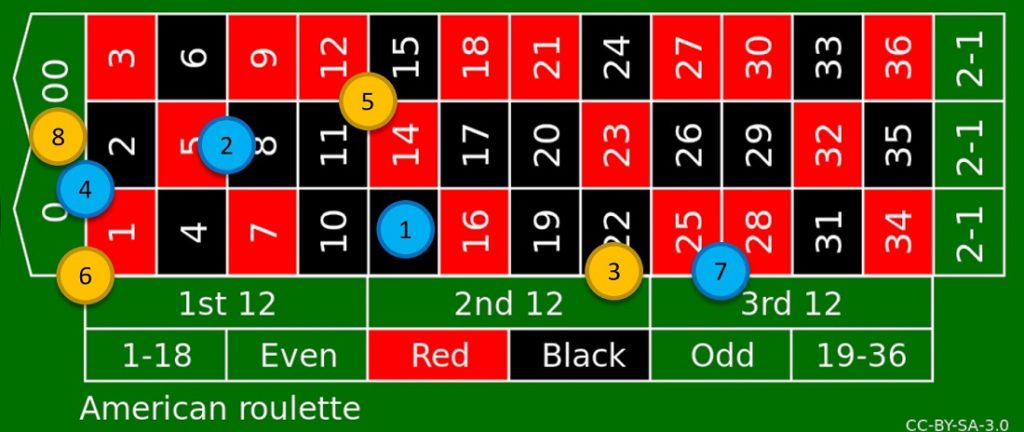
Outside Bet Odds
Outside bets wager on certain characteristics of the numbers on the grid, and all have their separate squares placed outside of the main grid, hence the name. Because these bets cover much larger groupings of the numbers, they are more likely to win; but to offset this, they have much lower payouts. The outside bets you can place are:
-
Column bets
Wager that the ball will land on any of the 12 numbers on one column of the grid. To indicate this bet, chips are placed on the specific column markers at the end of each column on the grid. This bet pays out 2 to 1.
-
Dozen bets
Wager that the ball will land on 12 numbers in a sequence. These sequences, however, are only limited to the 1 to 12, 13 to 24, and 25 to 36 sequences. To indicate this bet, chips are placed on the named spaces below the grid. This bet pays out 2 to 1.
-
Even / Odd bets
Wager that the ball will land on either an even or an odd number. To indicate this bet, chips are placed on the named Even or Odd spaces below the grid. This bet pays out 1 to 1.
-
High / Low bets
Wager that the ball will land on the low half of the grid (numbers 1 to 18) or the high half of the grid (19 to 36). To indicate this bet, chips are placed on the specified spaces below the grid. This bet pays out 1 to 1.
-
Colour bets
Wager that the ball will land on a number with either a black or a red colour. To indicate this bet, chips are placed on the specified colour spaces below the grid. This bet pays out 1 to 1.
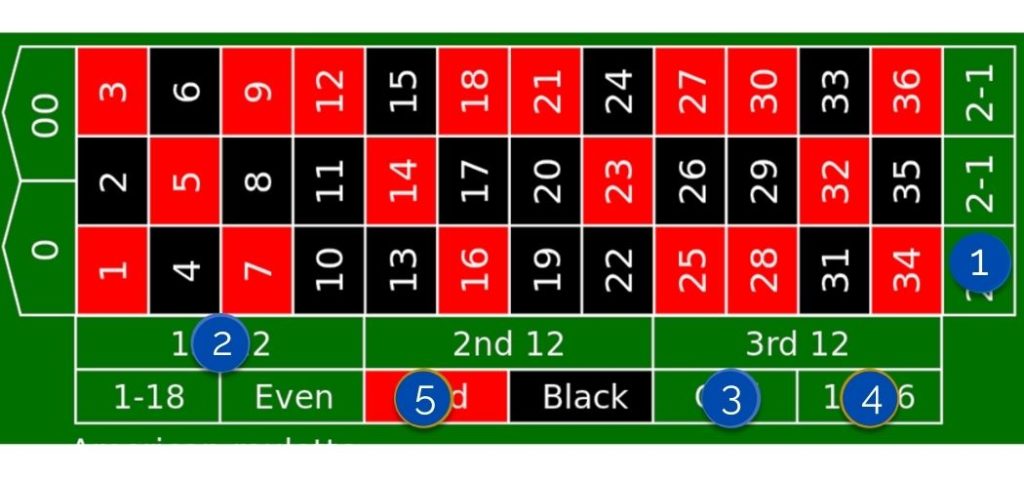
Call Bets
Now, some casinos allow players to place a third category of bets that aren’t marked on the standard layout. These call bets are, as their name suggests, called out to the croupier along with the player’s bet, which is then placed on the table grid based on the configuration of the bet. Most popular in French roulette games, call bets are also offered on many online European roulette tables to add a bit more interest to the game, especially for high-stakes players.
The reason why these bets are not marked on the table is that they are based on sections on the roulette wheel or specific number combinations, rather than positions on the grid. As such, the payouts for these bets depend on the type of bets are placed on the specific numbers (which are typically straight-up or split bets).
Call bets are further subdivided into fixed call bets and variable call bets. The fixed bets wager on specific sections of the wheel (which we’ve shown on the diagram above), while variable bets wager on specific sets of numbers. The fixed bets in a typical live roulette game include:
- Neighbours of zero or voisins du zéro bets wager on seventeen numbers on the sector of the wheel between the numbers 22 and 25. On the European roulette wheel, these numbers are 22, 18, 29, 7, 28, 12, 35, 3, 26, 0, 32, 15, 19, 4, 21, 2, and 25. Placing this bet costs multiples of 9 chips, which are placed on the table as follows:
- 2 chips on the 0-2-3 trio;
- 2 chips on the 25-26-28-29 corner; and
- 1 chip each for the 4-7, 12-15, 18-19, 21-22, and 32-35 splits.
- Third of the wheel or le tiers du cylindre bets wager on the twelve numbers on the sector of the wheel opposite the neighbours of zero. These numbers are 27, 13, 36, 11, 30, 8, 23, 10, 5, 24, 16, and 33. Placing this bet costs multiples of 6 chips, with one chip placed on each of the splits.
- Zero game or jeu zéro bets wager on seven numbers surrounding 0 on the roulette wheel. These numbers are 12, 35, 3, 26, 0, 32, and 15. Placing this bet costs multiples of 4 chips and are placed on the table as follows:
- 1 chip on 26 as a straight-up bet; and
- 1 chip each on the 0-3, 12-15, and 32-35 splits.
- Orphans or orphelins bets wager on eight numbers on two split sections of the wheel that are not included in the voisins or tiers bets. These numbers are 1, 20, 14, 31, 9, 17, 34, and 6. Placing this bet costs multiples of 5 chips, which are placed on the table as follows:
- 1 chip on 1 as a straight-up bet; and
- 1 chip on the 6-9, 14-17, 17-20, and 31-34 splits.
The following variable call bets choose specific patterns of numbers and, as the name suggests, vary in both position, value, and payout. Because of this, we won't go into too much detail on the odds of these bets later, but we will still list them here for reference:
- Neighbours bets wager on a number of choice and 2 extra numbers adjacent to it on either side. (For example, calling "1 and the neighbours" means betting on 16, 33, 1, 20, and 14.) Placing this bet costs multiples of 5 chips, which are placed as straight-up bets on each number.
- Finals or finale bets wager on all numbers on the table that share the same ones digit. (For example, calling "finales 2" means you will bet on 2, 12, 22, and 32.) Placing this bet costs either 3 or 4 chips, which are all placed as straight-up bets.
- Full complete or maximum bets place all inside bets on and around a number of your choice. This is the most expensive (and most rewarding) bet one can place in roulette, and combines so many different bets that it is only announced to the croupier and not placed on the table. The chip cost, payouts, and odds of winning these bets are also highly variable, and are therefore beyond the scope of this guide (we are still talking about roulette odds, after all).
Roulette Odds Summary
Now, we can tell that all of these betting types are a bit of a challenge to wrap your head around, and that’s totally normal. If you don’t want to get into the complexities of the call bets, you don’t have to - after all, not all casinos actually allow them to be played. If you’re still starting out, all you really need to learn are the inside and outside bets as those are the ones that will always show up at the roulette table.
To summarize everything, we’ve compiled a handy table below that lists all of the bet types we’ve discussed, their roulette payouts, and their odds:
| Bet | Winning Numbers | Payout | Odds | |
| European | American | |||
| Single / Straight-Up | 1 | 35 to 1 | 2.70% | 2.63% |
| Split | 2 | 17 to 1 | 5.41% | 5.26% |
| Street | 3 | 11 to 1 | 8.11% | 7.89% |
| Trio | 3 | 11 to 1 | 8.11% | 7.89% |
| Corner / Square | 4 | 8 to 1 | 10.81% | 10.53% |
| Basket | 4 (E) 5 (A) | 8 to 1 (E) 6 to 1 (A) | 10.81% (E) 13.51% (A) | 10.53% (E) 13.16% (A) |
| Line / Double Street | 6 | 5 to 1 | 16.22% | 15.78% |
| Green | 1 (E) 2 (A) | 35 to 1 (E) 17 to 1 (A) | 2.70% (E) 5.41% (A) | 2.63% (E) 5.26% (A) |
| Column | 12 | 2 to 1 | 32.43% | 31.58% |
| Dozen | 12 | 2 to 1 | 32.43% | 31.58% |
| Even / Odd | 18 | 1 to 1 | 48.65% | 47.37% |
| High / Low | 18 | 1 to 1 | 48.65% | 47.37% |
| Colour | 18 | 1 to 1 | 48.65% | 47.37% |
| Neighbours of zero | 17 | 1 Trio 1 Corner 5 Splits | 45.95% | 44.74% |
| Third of the wheel | 12 | 6 Splits | 32.43% | 31.58% |
| Zero game | 7 | 1 Straight-up 3 Splits | 18.92% | 18.42% |
| Orphans | 9 | 1 Straight-up 4 Splits | 21.62% | 21.05% |
| Neighbours | 5 | 5 Straight-ups | 13.51% | 13.16% |
| Finales | 3 or 4 | 3 or 4 Straight-ups | 8.11% or 10.81% | 7.89% or 10.53% |
Note: (E) indicates a European table; (A) indicates an American table.
How do you Calculate Roulette Odds and Payouts?
Now that we've covered all of the basic bets available in roulette, it's finally time to dive into the mathematics of the game. As we already know, roulette is a game of pure chance, which means that whatever number the ball will land on is decided completely at random.
This is the case in all variants of roulette everywhere. If you play on one of the digital real money games, the number is dictated by a random number generator or RNG that cycles through the numbers in a chaotic manner. If you play on a real table, the opposite spin of the ball and wheel, as well as the bumps on the circular track around the wheel almost perfectly guarantees that the path of the ball cannot be predicted.
Calculating Roulette Odds
Because roulette is purely random, we can say that every number on the roulette table has an equal chance of being landed on. Knowing this, calculating the odds of every type of bet in roulette is just a matter of dividing the amount of winning numbers of the bet by the total amount of numbers on the grid. We can put this into a formula, which looks like this:

In the case of a straight-up bet (which bets on 1 number), our odds come out to:

Of course, this answer only applies to European tables, which only have 37 total numbers. For American tables with 38 numbers, our odds come out to:

Doing the same calculation on all of the different betting types gives us the table that we showed above.
Calculating Roulette Payouts
The payouts we showed in the table above can be difficult enough to memorize that you’ll find yourself needing a roulette payout calculator, there is actually a method behind the madness. Let’s illustrate this with another equation:

So what does this mean? To summarize, the payout on the roulette table for any given bet is 1 less than 36 divided by the amount of the winning numbers of that bet. As an example, let’s ask, “What does roulette pay for the colour bet?” Now, we know that the colour bet covers 18 numbers on the grid. Plugging that into our formula, then, gives us:

We find that the formula gives us a payout of 1 for the colour bet, which lines up perfectly with the number in our table above. This also applies to all of the other bets we’ve listed in our table above, so as a bit of homework, try putting in some of the numbers we’ve placed in our table above and see if the numbers line up.
Mastering The Online Roulette Wheel
After you have odd and payouts covered, it is time to become a master at the roulette wheel online. Our suggestion is to take everything you've learned here and put it to the test in a real game of roulette. After all, it's often a lot more effective (and fun) to learn by doing, and playing roulette is arguably one of the best ways to test your game knowledge and try out new strategies.
And if you are looking for an online casino in which to try your luck, then look no further. We at Inside Casino provide curated catalogues of the best online casinos and casino games you can play in Canada, each entry hand-picked for its high standards of security, convenience, and entertainment value.
Roulette Odds FAQs
What is the safest bet in roulette?
Of the many different types of bets you can place in roulette, Even/Odd, High/Low, and Colour bets are considered the safest bets as they share the biggest odds of winning at 48.65% (or 47.37% on the American variant). However, they also give the lowest payouts at 1:1 only.
Now, there’s a bit more nuance as to what a “safe bet” actually means. In the case of safe bet types, the ones we mentioned above are sufficient answers. However, some players might take this to mean bets that provide the most consistent profits or something along those lines. In such cases, we really can’t give any concrete advice as roulette is purely a game of chance.
How many numbers should you play in roulette?
The numbers you should bet on in a game of roulette really depends on your betting strategy and goals. A more high-risk, high-reward strategy will typically bet on fewer numbers, while those who want better odds but lower payouts would want to bet on as many numbers as possible.
Now, as for the question of which of these approaches is actually more effective at winning money, the answer is neither. Based on what we've learned about the casino house edge, every single bet that you place statistically loses a bit of money every time. No matter what approach you use, your initial bankroll will eventually dry up the longer you play. Knowing this, the best way to get the most out of your roulette session is to manage your bankroll wisely.
How many Reds are in a row roulette?
In a roulette table, there are 12 rows or streets with 3 numbers each. And in each row, one or two of these numbers are red (with the remainder being black).
Are roulette games rigged?
If you play at a reputable online casino, no roulette game you will find there is rigged to make the player lose more than they statistically should. Whether you are playing a fully digital app or those with live dealers, roulette games will run on the same mechanisms of randomness that make roulette the game of chance that it is.
Of course, some of the more cynical players among you will say that all casino games are rigged, and in some respects, you are right to thank that way. All casinos are businesses at their core, and all businesses have to make money one way or another. And for casinos, the way they make money is through the house edge. By changing certain aspects of the game to tip the flow of money in the casino's favour (lower-than-even payouts in the case of roulette), the casino has effectively "rigged" the game. Whether or not this is a deal-breaker is for you to decide.
